Analysis of Nestle Plc's Recruitment and Training Strategies Project
VerifiedAdded on 2023/01/20
|15
|898
|61
Report
AI Summary
This project report examines Nestle Plc's recruitment, selection, and training strategies in the context of globalization. The report aims to explore these strategies to meet international standards. It includes objectives to understand current recruitment processes, identify necessary changes for globalization, address issues related to labor migration, and recommend improvements. The research employs a qualitative method, using questionnaires with HR managers from Nestle Plc. Findings reveal uncertainties about current processes and a need for change. Recommendations are provided to improve training processes and address challenges. The report covers project management aspects like scope, cost, time, communication, risk, and resources, along with a Gantt chart and detailed methodology. The reflection highlights the enhanced understanding of recruitment and training strategies gained through the research. References to books and journals are also included.

Managing as successful
Business Project
Business Project
Paraphrase This Document
Need a fresh take? Get an instant paraphrase of this document with our AI Paraphraser
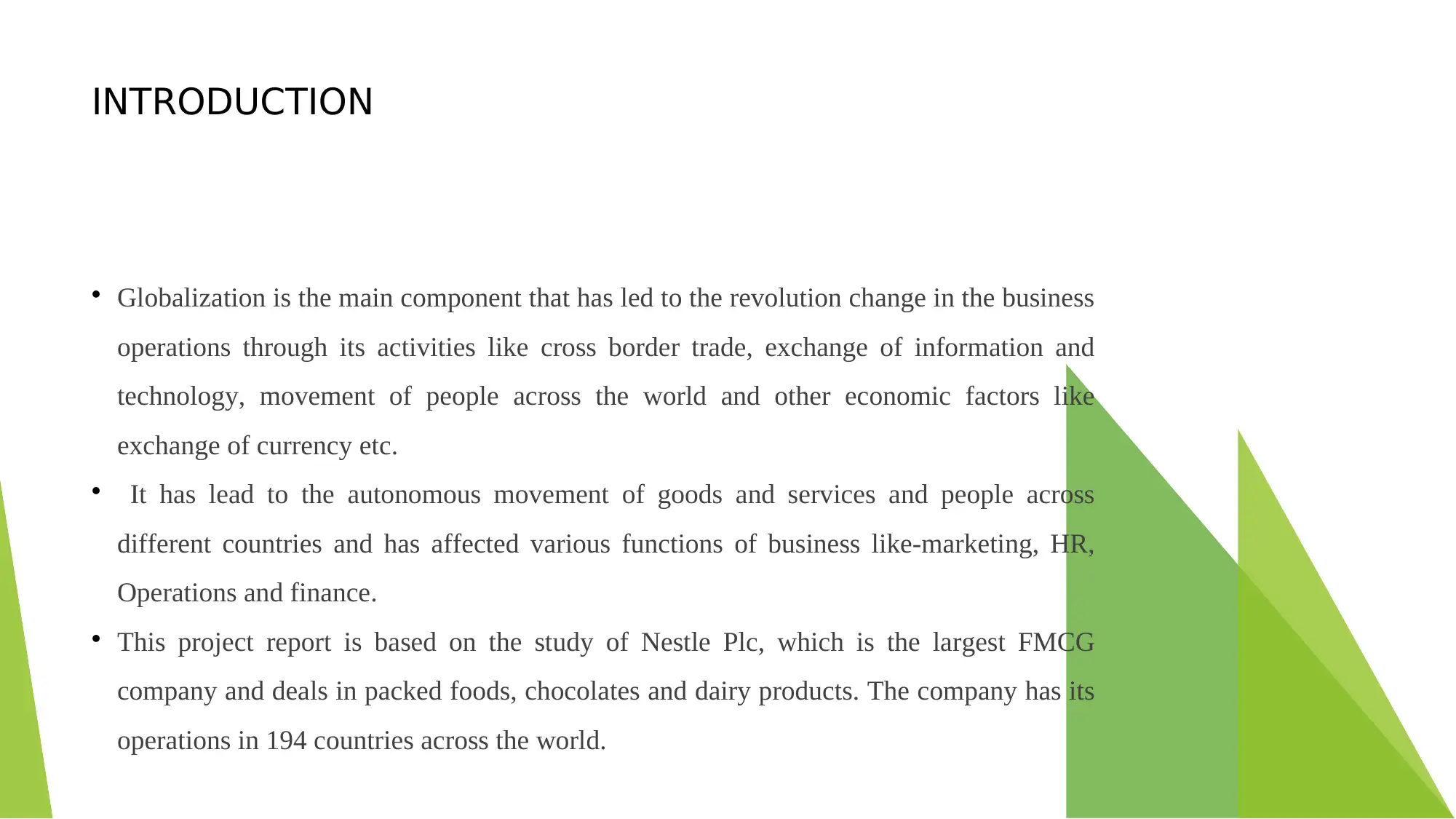
INTRODUCTION
Globalization is the main component that has led to the revolution change in the business
operations through its activities like cross border trade, exchange of information and
technology, movement of people across the world and other economic factors like
exchange of currency etc.
It has lead to the autonomous movement of goods and services and people across
different countries and has affected various functions of business like-marketing, HR,
Operations and finance.
This project report is based on the study of Nestle Plc, which is the largest FMCG
company and deals in packed foods, chocolates and dairy products. The company has its
operations in 194 countries across the world.
Globalization is the main component that has led to the revolution change in the business
operations through its activities like cross border trade, exchange of information and
technology, movement of people across the world and other economic factors like
exchange of currency etc.
It has lead to the autonomous movement of goods and services and people across
different countries and has affected various functions of business like-marketing, HR,
Operations and finance.
This project report is based on the study of Nestle Plc, which is the largest FMCG
company and deals in packed foods, chocolates and dairy products. The company has its
operations in 194 countries across the world.
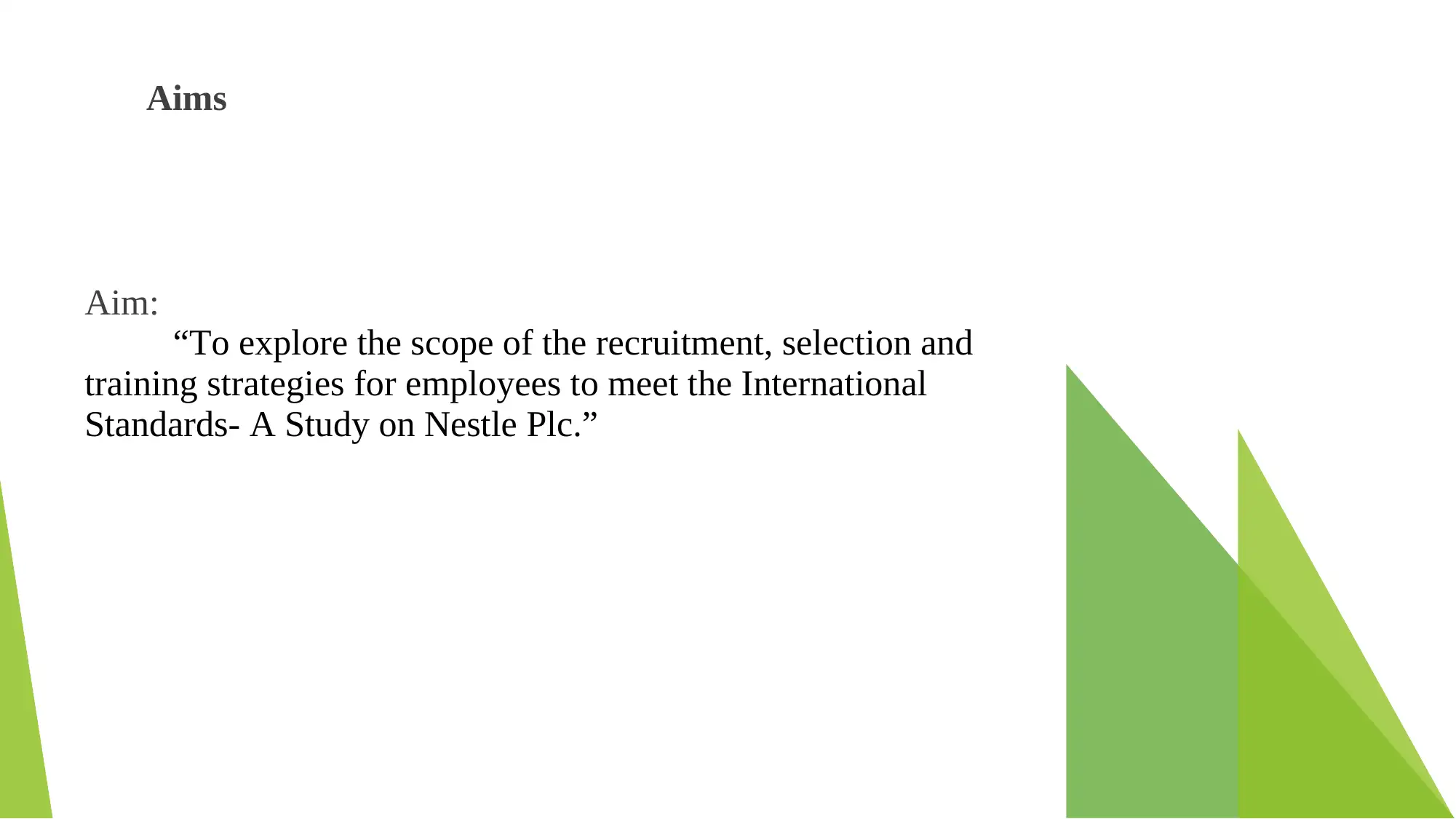
Aims
Aim:
“To explore the scope of the recruitment, selection and
training strategies for employees to meet the International
Standards- A Study on Nestle Plc.”
Aim:
“To explore the scope of the recruitment, selection and
training strategies for employees to meet the International
Standards- A Study on Nestle Plc.”
⊘ This is a preview!⊘
Do you want full access?
Subscribe today to unlock all pages.

Trusted by 1+ million students worldwide
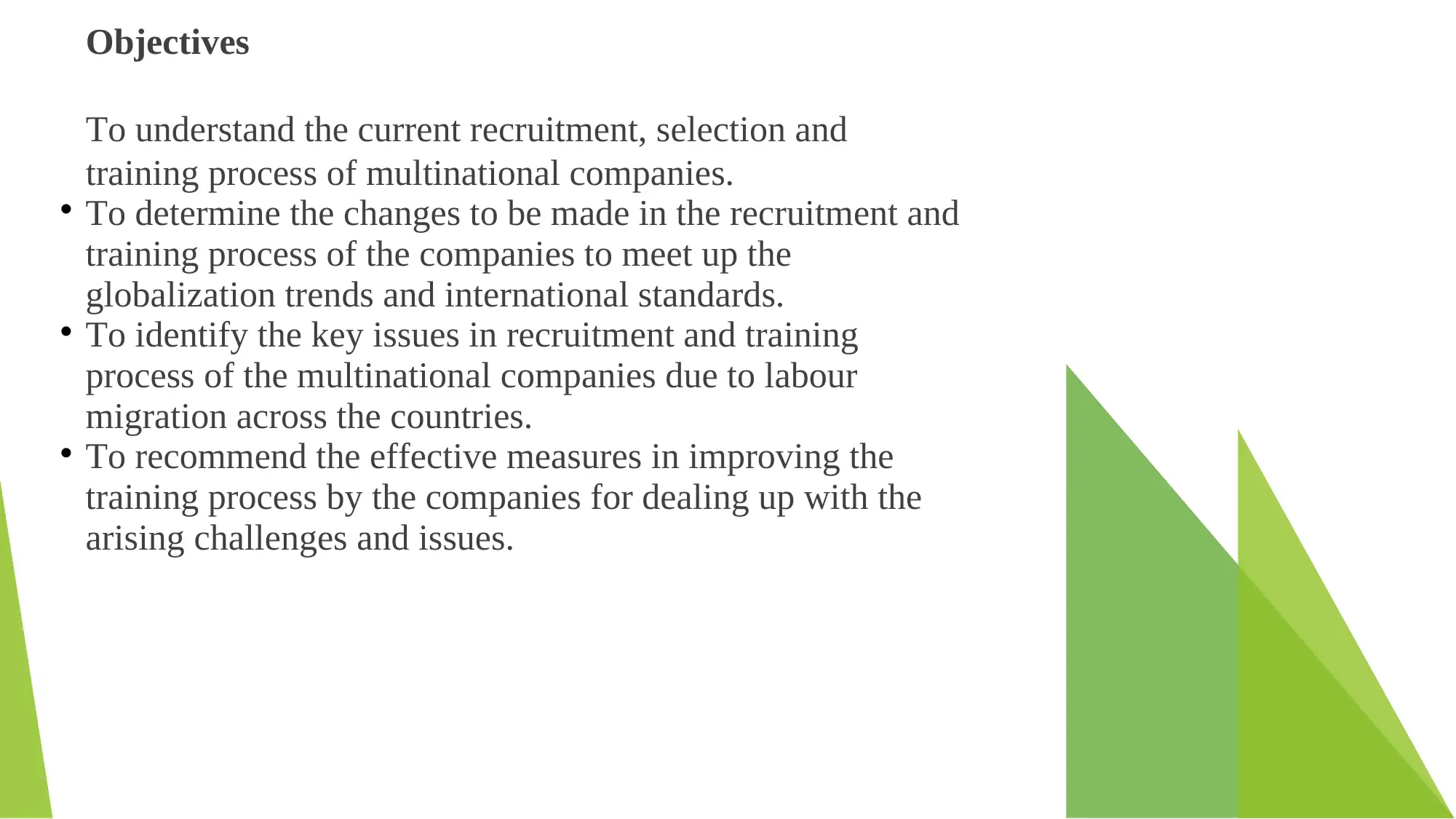
Objectives
To understand the current recruitment, selection and
training process of multinational companies.
To determine the changes to be made in the recruitment and
training process of the companies to meet up the
globalization trends and international standards.
To identify the key issues in recruitment and training
process of the multinational companies due to labour
migration across the countries.
To recommend the effective measures in improving the
training process by the companies for dealing up with the
arising challenges and issues.
To understand the current recruitment, selection and
training process of multinational companies.
To determine the changes to be made in the recruitment and
training process of the companies to meet up the
globalization trends and international standards.
To identify the key issues in recruitment and training
process of the multinational companies due to labour
migration across the countries.
To recommend the effective measures in improving the
training process by the companies for dealing up with the
arising challenges and issues.
Paraphrase This Document
Need a fresh take? Get an instant paraphrase of this document with our AI Paraphraser
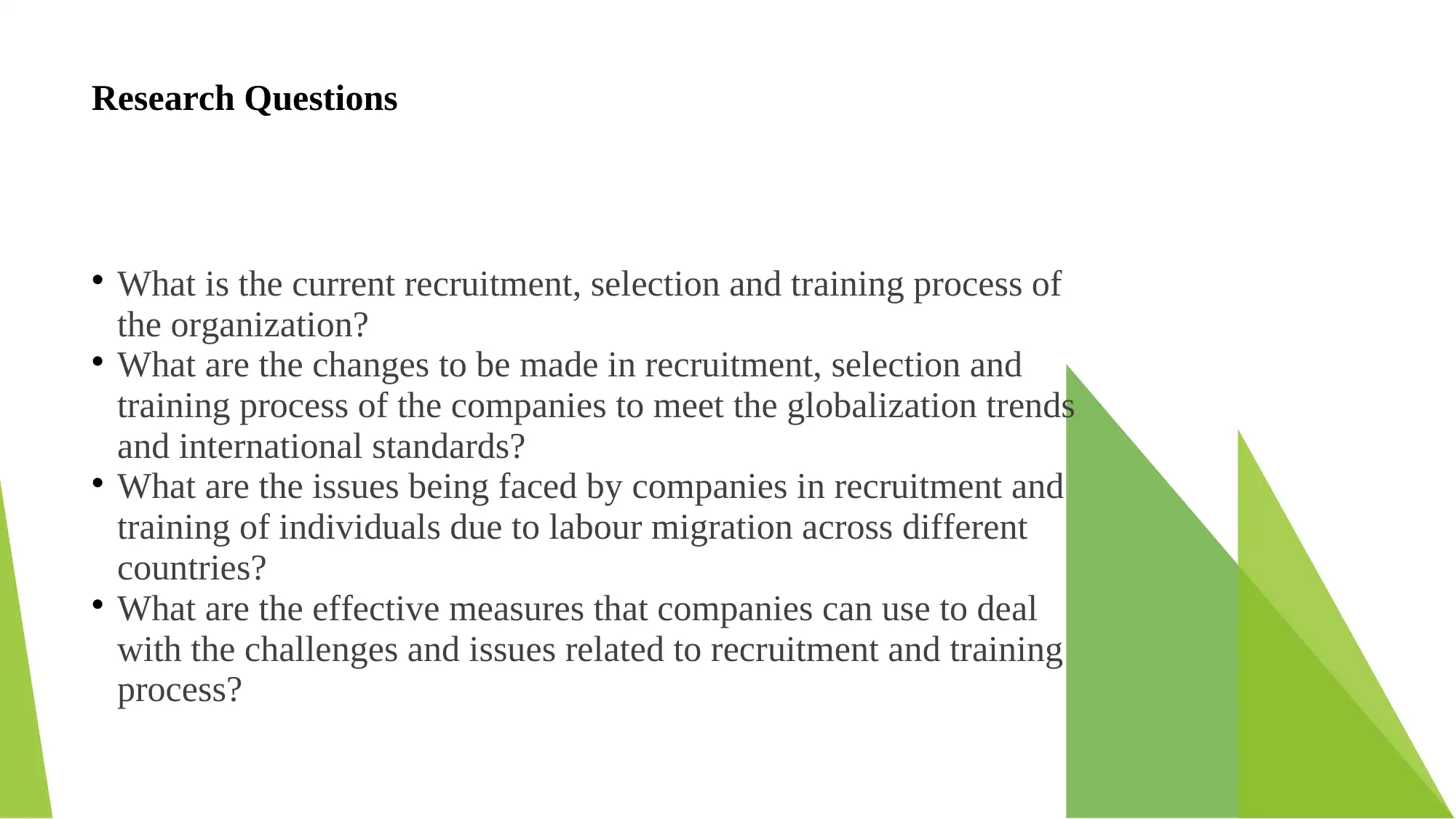
Research Questions
What is the current recruitment, selection and training process of
the organization?
What are the changes to be made in recruitment, selection and
training process of the companies to meet the globalization trends
and international standards?
What are the issues being faced by companies in recruitment and
training of individuals due to labour migration across different
countries?
What are the effective measures that companies can use to deal
with the challenges and issues related to recruitment and training
process?
What is the current recruitment, selection and training process of
the organization?
What are the changes to be made in recruitment, selection and
training process of the companies to meet the globalization trends
and international standards?
What are the issues being faced by companies in recruitment and
training of individuals due to labour migration across different
countries?
What are the effective measures that companies can use to deal
with the challenges and issues related to recruitment and training
process?
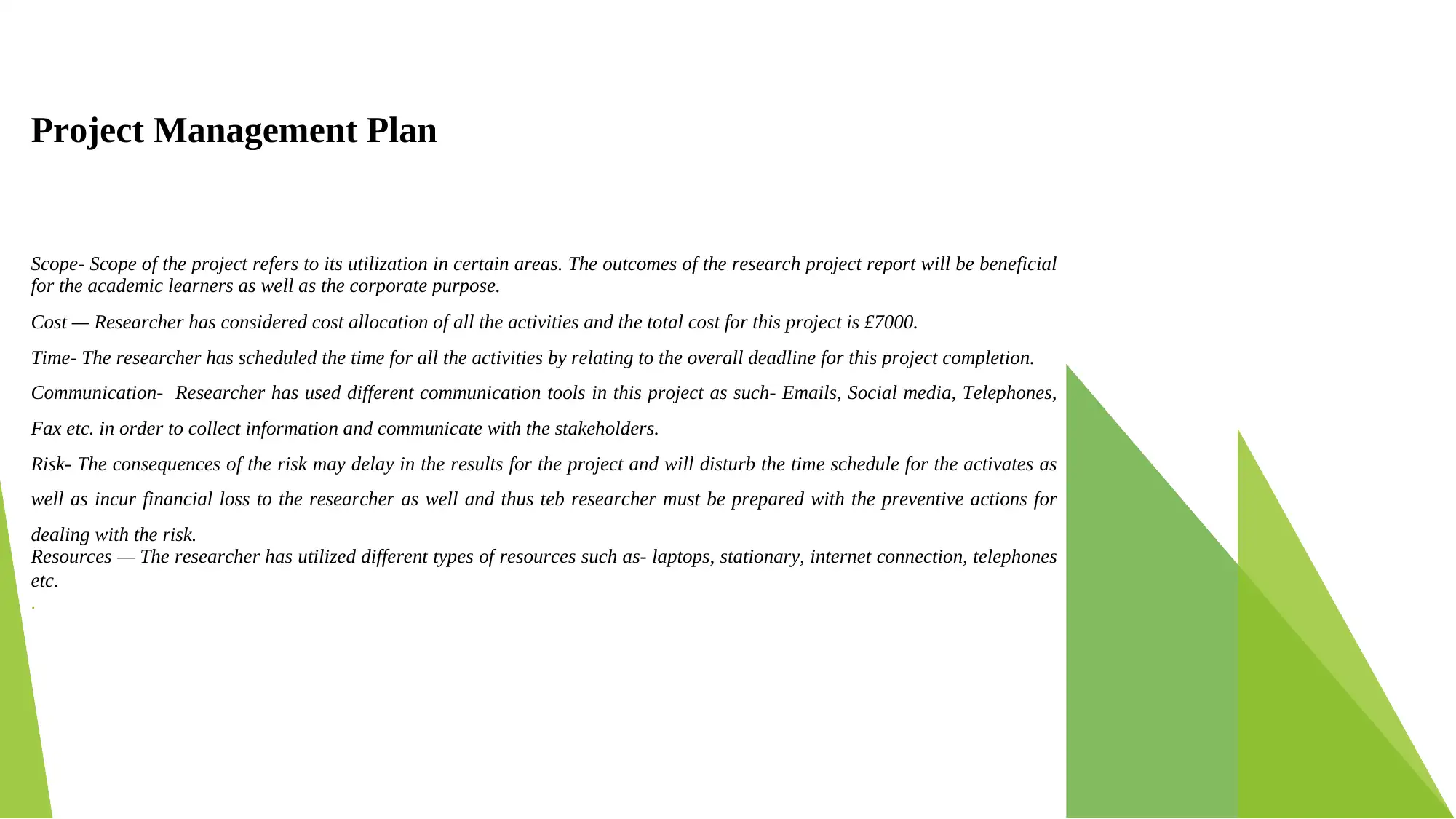
Project Management Plan
Scope- Scope of the project refers to its utilization in certain areas. The outcomes of the research project report will be beneficial
for the academic learners as well as the corporate purpose.
Cost — Researcher has considered cost allocation of all the activities and the total cost for this project is £7000.
Time- The researcher has scheduled the time for all the activities by relating to the overall deadline for this project completion.
Communication- Researcher has used different communication tools in this project as such- Emails, Social media, Telephones,
Fax etc. in order to collect information and communicate with the stakeholders.
Risk- The consequences of the risk may delay in the results for the project and will disturb the time schedule for the activates as
well as incur financial loss to the researcher as well and thus teb researcher must be prepared with the preventive actions for
dealing with the risk.
Resources — The researcher has utilized different types of resources such as- laptops, stationary, internet connection, telephones
etc.
.
Scope- Scope of the project refers to its utilization in certain areas. The outcomes of the research project report will be beneficial
for the academic learners as well as the corporate purpose.
Cost — Researcher has considered cost allocation of all the activities and the total cost for this project is £7000.
Time- The researcher has scheduled the time for all the activities by relating to the overall deadline for this project completion.
Communication- Researcher has used different communication tools in this project as such- Emails, Social media, Telephones,
Fax etc. in order to collect information and communicate with the stakeholders.
Risk- The consequences of the risk may delay in the results for the project and will disturb the time schedule for the activates as
well as incur financial loss to the researcher as well and thus teb researcher must be prepared with the preventive actions for
dealing with the risk.
Resources — The researcher has utilized different types of resources such as- laptops, stationary, internet connection, telephones
etc.
.
⊘ This is a preview!⊘
Do you want full access?
Subscribe today to unlock all pages.

Trusted by 1+ million students worldwide

Time Scale, Gantt chart
Paraphrase This Document
Need a fresh take? Get an instant paraphrase of this document with our AI Paraphraser
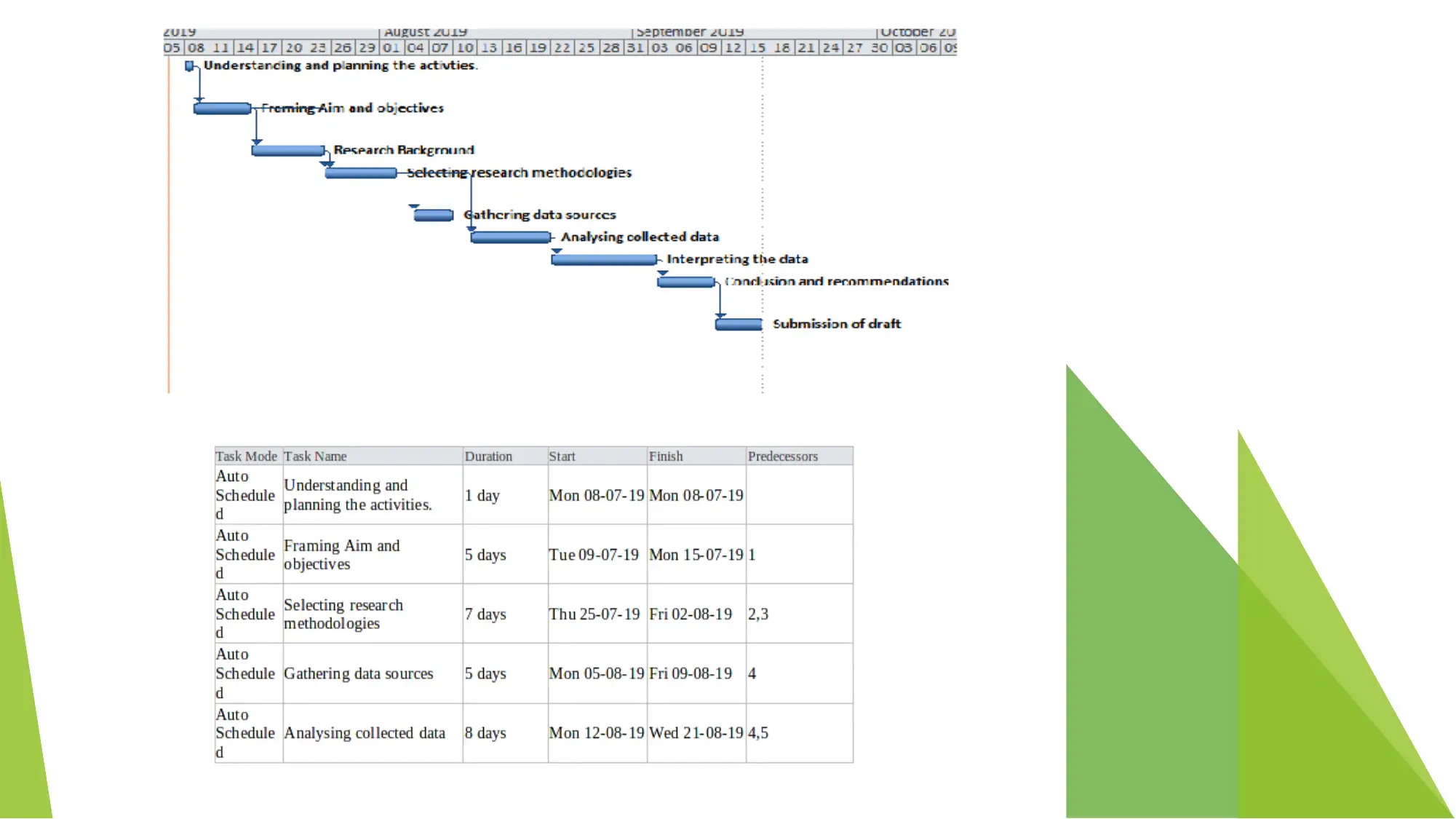
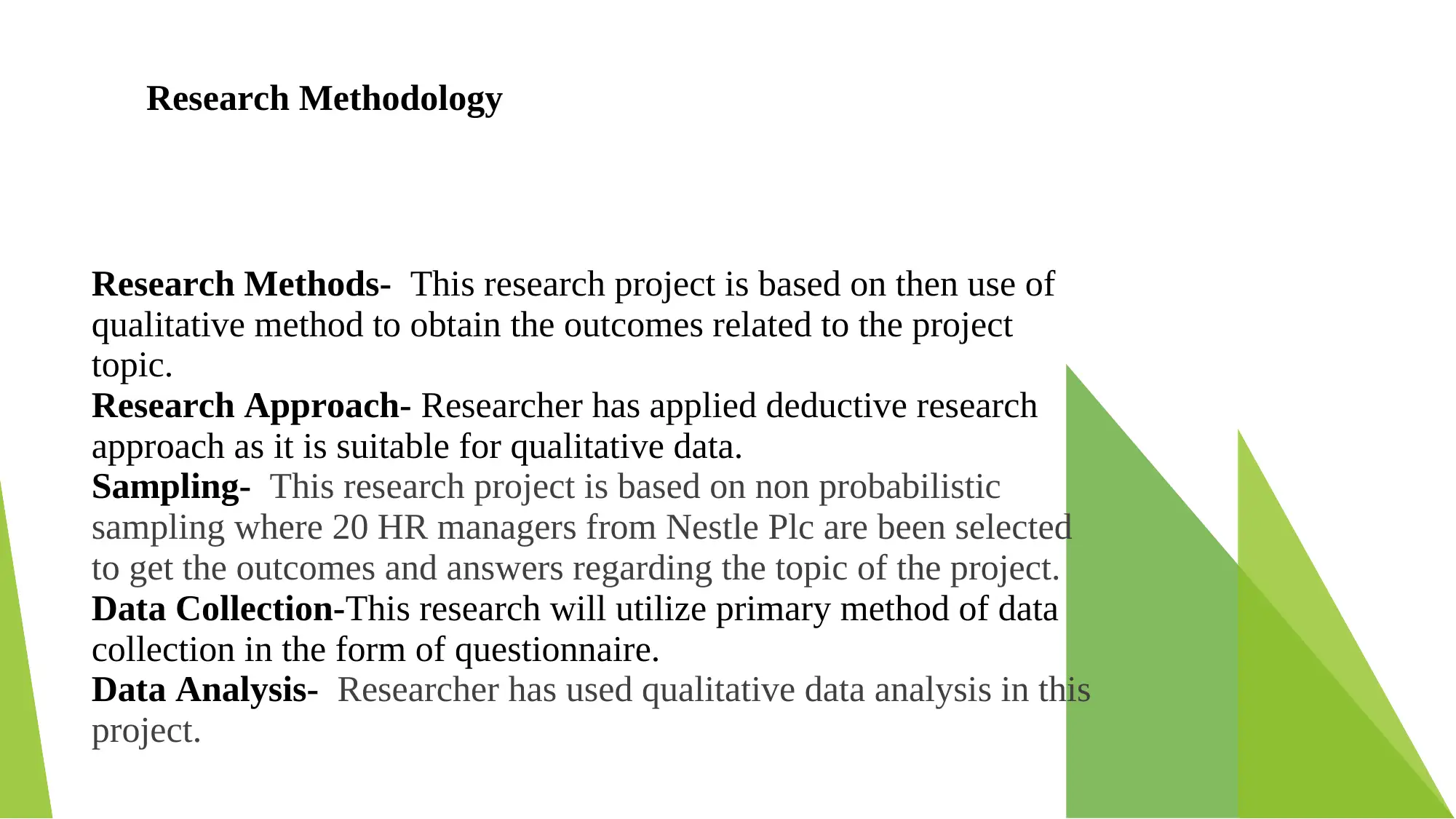
Research Methodology
Research Methods- This research project is based on then use of
qualitative method to obtain the outcomes related to the project
topic.
Research Approach- Researcher has applied deductive research
approach as it is suitable for qualitative data.
Sampling- This research project is based on non probabilistic
sampling where 20 HR managers from Nestle Plc are been selected
to get the outcomes and answers regarding the topic of the project.
Data Collection-This research will utilize primary method of data
collection in the form of questionnaire.
Data Analysis- Researcher has used qualitative data analysis in this
project.
Research Methods- This research project is based on then use of
qualitative method to obtain the outcomes related to the project
topic.
Research Approach- Researcher has applied deductive research
approach as it is suitable for qualitative data.
Sampling- This research project is based on non probabilistic
sampling where 20 HR managers from Nestle Plc are been selected
to get the outcomes and answers regarding the topic of the project.
Data Collection-This research will utilize primary method of data
collection in the form of questionnaire.
Data Analysis- Researcher has used qualitative data analysis in this
project.
⊘ This is a preview!⊘
Do you want full access?
Subscribe today to unlock all pages.

Trusted by 1+ million students worldwide
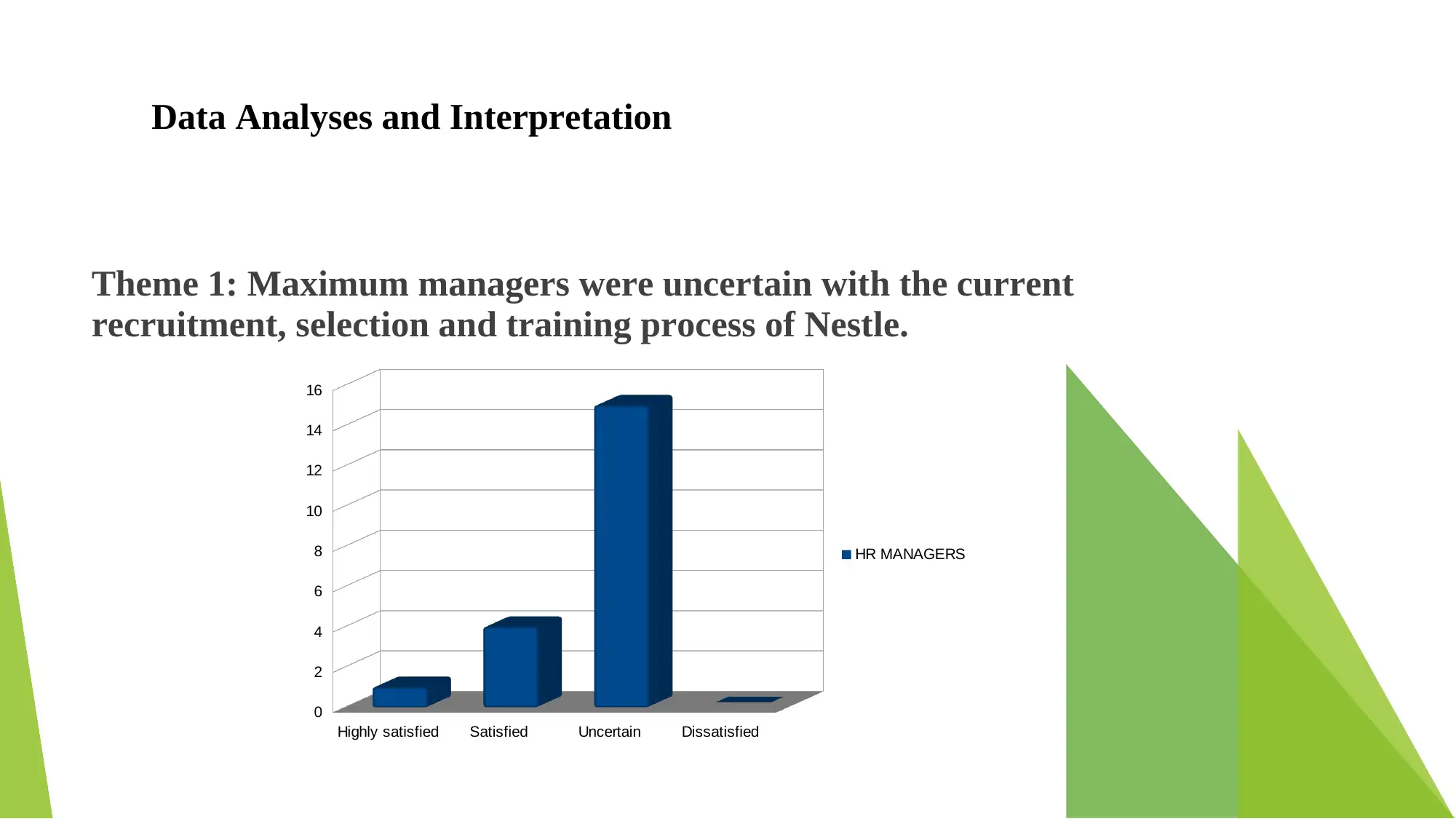
Data Analyses and Interpretation
Theme 1: Maximum managers were uncertain with the current
recruitment, selection and training process of Nestle.
Highly satisfied Satisfied Uncertain Dissatisfied
0
2
4
6
8
10
12
14
16
HR MANAGERS
Theme 1: Maximum managers were uncertain with the current
recruitment, selection and training process of Nestle.
Highly satisfied Satisfied Uncertain Dissatisfied
0
2
4
6
8
10
12
14
16
HR MANAGERS
Paraphrase This Document
Need a fresh take? Get an instant paraphrase of this document with our AI Paraphraser
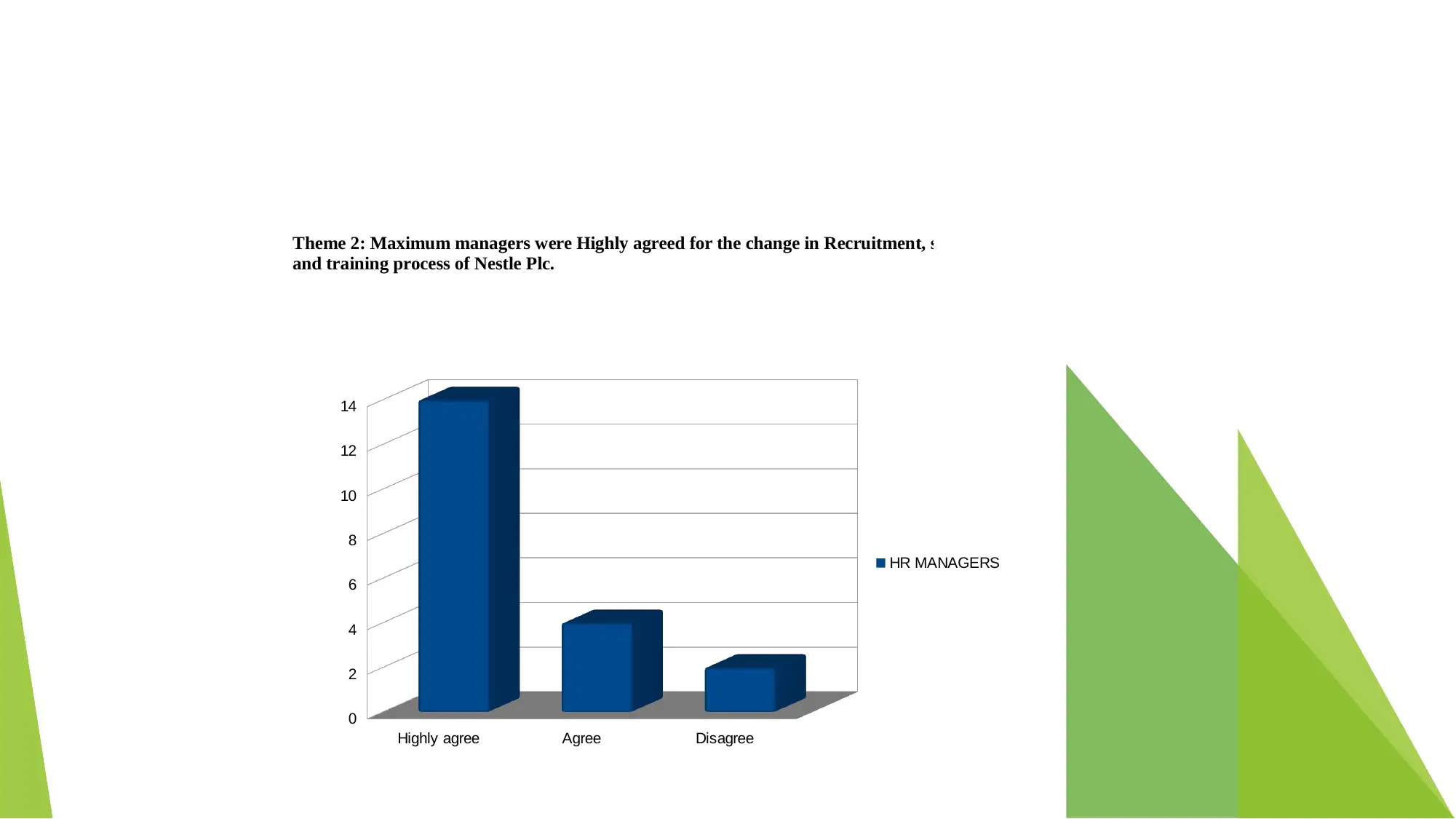
Theme 2: Maximum managers were Highly agreed for the change in Recruitment, selection
and training process of Nestle Plc.
Highly agree Agree Disagree
0
2
4
6
8
10
12
14
HR MANAGERS
and training process of Nestle Plc.
Highly agree Agree Disagree
0
2
4
6
8
10
12
14
HR MANAGERS
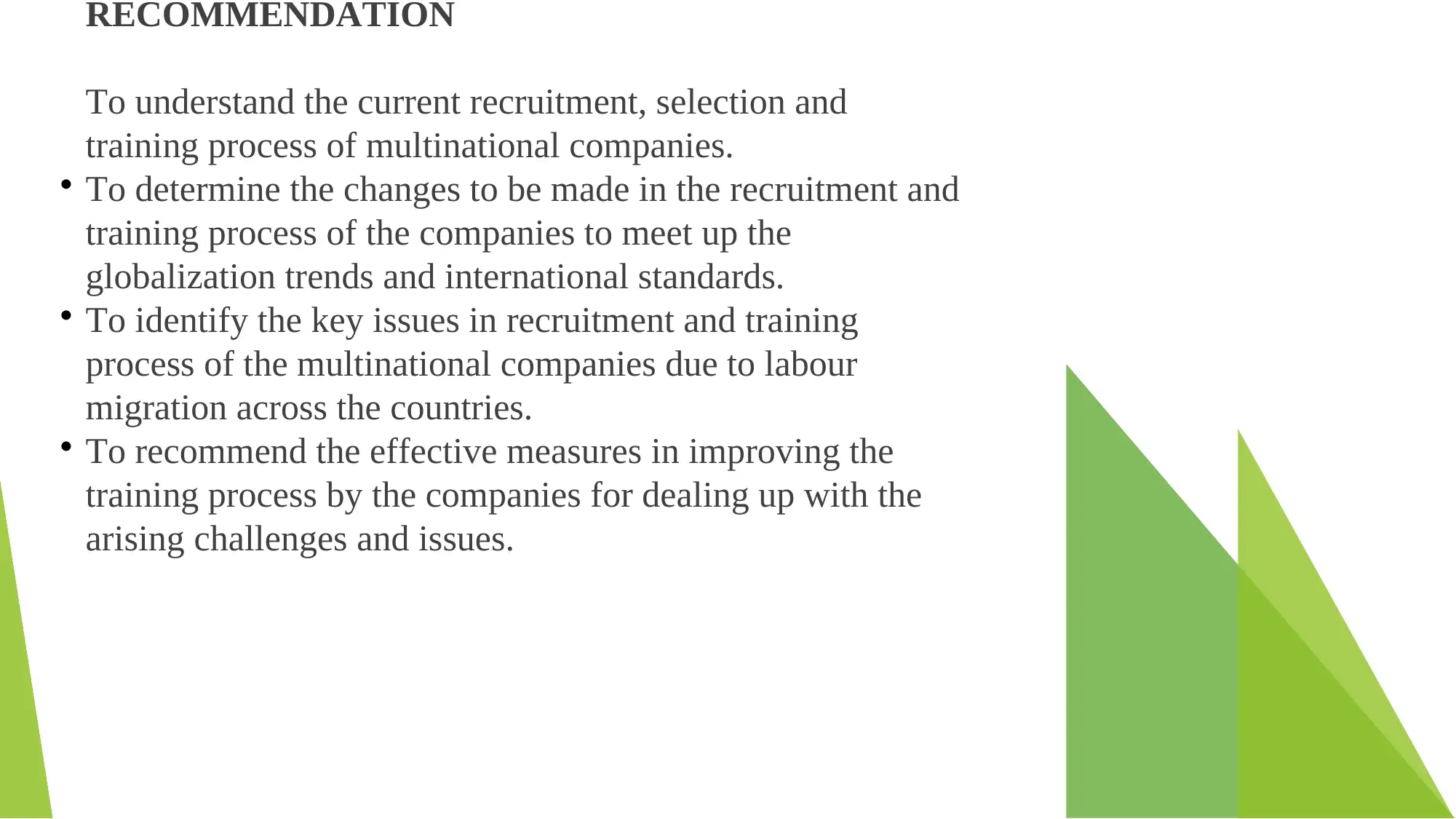
RECOMMENDATION
To understand the current recruitment, selection and
training process of multinational companies.
To determine the changes to be made in the recruitment and
training process of the companies to meet up the
globalization trends and international standards.
To identify the key issues in recruitment and training
process of the multinational companies due to labour
migration across the countries.
To recommend the effective measures in improving the
training process by the companies for dealing up with the
arising challenges and issues.
To understand the current recruitment, selection and
training process of multinational companies.
To determine the changes to be made in the recruitment and
training process of the companies to meet up the
globalization trends and international standards.
To identify the key issues in recruitment and training
process of the multinational companies due to labour
migration across the countries.
To recommend the effective measures in improving the
training process by the companies for dealing up with the
arising challenges and issues.
⊘ This is a preview!⊘
Do you want full access?
Subscribe today to unlock all pages.

Trusted by 1+ million students worldwide
1 out of 15
Related Documents
Your All-in-One AI-Powered Toolkit for Academic Success.
+13062052269
info@desklib.com
Available 24*7 on WhatsApp / Email
![[object Object]](/_next/static/media/star-bottom.7253800d.svg)
Unlock your academic potential
Copyright © 2020–2026 A2Z Services. All Rights Reserved. Developed and managed by ZUCOL.





